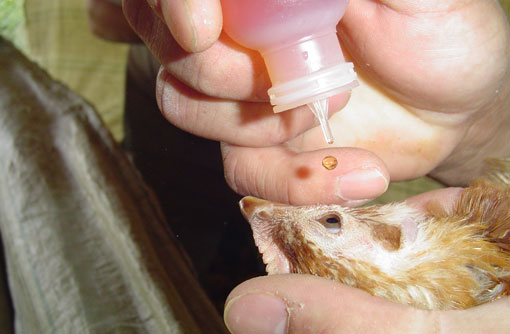New vaccine aims to beat the march of Mycoplasma synoviae

Mycoplasma synoviae (MS) is a growing problem in the poultry sector, which often goes undetected.
But according to Peter Cargill from Wyatt Poultry Veterinary Services in Hereford, producers should take a proactive approach when it comes to tackling the disease, because it can have devastating consequences on both flock performance and profitability.
“MS predisposes birds to other disease agents and, on top of that, it will also have a big impact on egg production,” he explains.
One of the most common types of MS in layers is EAA (Egg Apex Abnormality), better known as “glass-top eggs” syndrome.
“We are starting to see more EAA on UK farms and it’s losing people a lot of money,” says Mr Cargill.
EAA causes a 2-3% drop in production, lowers egg weight and increases breakages. In the Netherlands it is costing the egg industry an estimated k3.1m (£2.48m) annually.
Despite its devastating effects, in many cases the pathogen often goes unrecognised.
“It is a very clever bacteria. It can hide from the immune system and, because the immune system isn’t going to attack its own cells, it can take a long time for the birds to develop antibodies, so MS can be difficult to diagnose.
“The intracellular nature of MS, together with its lack of cell wall, unlike other bacteria, makes it very difficult to treat.”
Combined with the fact it can cause a whole host of secondary infections, the disease can be fatal if left untreated.
“MS causes the lining of the respiratory tract – the cilia, which is the primary defence mechanism of the respiratory system – to become damaged,” he says. “Bacteria then start to grow in the tract and spread around the body via the blood stream.
“But E coli is a secondary invader, never a primary pathogen. So you’ve got to look at the underlying reasons as to why you’ve got a disease and be pragmatic about it.”
Treatment and control
Paying close attention to clinical symptoms and ensuring the farm operates to a high level of biosecurity minimises the threat.
“The main symptoms to look out for are a drop in egg production, and abnormal or fragile eggs,” he explains.
Previously, antibiotics have been used to treat MS, but they only work by suppressing the disease, often making diagnosis more difficult.
“There’s a lot of pressure to manage the use of antibiotics and the control is going to get tighter and tighter, so we need to look at alternative ways to manage this.”
Vaccination
It is for this reason Mr Cargill has been the driving force in licensing the first live vaccine for MS, which is now available in the UK. Developed by Australian company Bioproperties, MS-H vaccine eyedrops suspension is available through prescription only from the vet.
It is the first temperature-sensitive vaccine of its kind, which means it is unable to survive in the lower half of the trachea and cannot generalise in the bird or cause damage to the cilia, which in the past have been the problems associated with traditional attenuated vaccines.
“In Germany, where they have been using the vaccine for 18 months in field trials, they have reduced the use of antibiotics by 90%,” says Mr Cargill. It should be administered in the form of an eyedrop of 30 micro litres in one eye, at least four weeks before the bird is first challenged with the agent. This could be as early as five weeks of age or within five weeks into the onset of lay, Mr Cargill explains.
“You should avoid using MS associated antibiotics after vaccination, because it will weaken the level of protection. But the vaccine can be applied as early as two weeks post antibiotics.”
| Control method that works |
|---|
Michael Clark of the Minster Veterinary Practice confirms that Mycoplasma synoviae is a growing problem for the layer sector, particularly with reference to Egg Apex Abnormality. “MS is a bacteria, so you can get it under control with medication,” he says. “In the layer sector, there are a few antibiotics available that have an effect against MS. A couple of them – Tylan and Demiguard – also have a nil egg withdrawal. “It’s not a particularly easy vaccine to use,” he adds. “Most live vaccines arrive as little freeze-dried pellets, cool-packed, through the post and you store them in the fridge. But the MS vaccine arrives with dry ice and has to be frozen. But at least with this emerging problem we’ve now got a control method that works.” |
